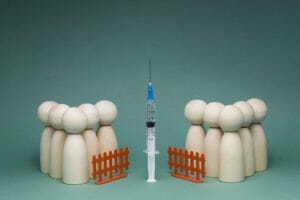
The year ahead is of course simply a continuation of the prior year, nothing magical occurs on the 1st day of January that creates a clean slate. Our actions, intent and social structure simply roll over, albeit that the Christmas or festive season creates a host of familial challenges, but on a global scale the world marches on.
Yet it is in our nature to seek new beginnings, release hope and optimism and search for a better period ahead. Inevitably this will involve hopes that relate to personal or family-based outcomes first, and then, perhaps local national and international next. Certainty, or at least a reasonable level of ability to plan with confidence has been shattered over the last 24 months, and it is likely to remain volatile going forward. This can create personal and societal anxiety and related changes in behaviour and wellbeing – a situation almost all practitioners and clinicians have had to face daily. This state of being impacts all our systems, but our immune system in particular.
Redundancy and Resilience
The evolution of redundancy in the immune system (the duplication of critical components or functions of a system with the intention of increasing reliability of the system,) has been a subject of debate for decades. The value of redundancy in host defence pathways is always conditional on the nature of infection and the health of the host and the environment. What is understood is that immune responses are layered and redundant, where one-layer falters, another can be activated to help. This allows for the wide range of resilience within the human population to both acute and chronic immune insults. To ensure appropriate adaptability there are many genetic variations in our immune cells, and all are influenced by the surrounding environmental pressures.[i]
The modern human environment is unnatural from the evolutionary standpoint: abnormally high population density on the one hand, and access to antibiotics, vaccination, sanitation, highly processed foods, and hygiene products on the other hand, are not exactly natural for human species in a sense that the vast majority of human biology was shaped by an entirely different environment. This is reflected in the epidemiology of death, with the contemporary West seeing modern non-communicable or lifestyle related diseases leading to highest mortality, whereas in sub-Saharan Africa, infectious communicable disease deaths still dominate.
Immunity to any pathogen, including SARS-CoV-2, isn’t binary like a light switch, where you either switch on or off. Instead, it’s more like a dimmer switch: the human immune system can confer varying degrees of partial protection from a pathogen, which can stave off severe illness without necessarily preventing infection or transmission. It’s this partial protection that paves the way to endemicity. The partial-protection effect is one of the reasons that existing endemic coronaviruses, such as the one that causes the common cold, produce such mild symptoms. But immune flexibility and resilience also requires appropriate nutrition, as well as environmental congruence.[ii]
Resilience and Preparedness
Resilience embodies the personal qualities that enable one to thrive in the face of adversity and is not a trait that people have or do not have. It involves behaviours, thoughts and actions that can be learned and developed by anyone.[iii]
In their Journal of Allergy and Clinical Immunology article, the researchers define immunologic resilience as the capacity to preserve or restore immune competence and control inflammation in the face of infection or other antigenic challenges.[iv] After testing 522 patients entering their hospital with Covid-19 they used a novel array to qualify resilience based on measures of infection-fighting T cells, and blood cell gene expression signature – those that were deemed to have a higher level of resilience, regardless of age, fared better than those with lower levels. Albeit men fared less well than women at all grades.
The implication is that maintaining a well-prepared immune system will confer a survival benefit to people exposed to infectious challenges and non-communicable challenges and supports the integrative approach to lifestyle modifications that have shown capacity to optimise immune capacity.
‘Be Prepared’
As all scouts will know, Baden Powell’s motto of preparedness is a corner stone of the movement. Meaning that you were always in a state of readiness in mind and body to do your duty and face danger, if necessary, to help others. Regretfully in the UK and elsewhere, we have leaders, that despite having the possibility of a pandemic at the top of the health section of the national risk register since 2008, were woefully unprepared for SARS-Cov-2 and its effects.
In the UK we are crowded, old, fat, cramped, unequal and much visited – all factors that impact the ability to manage pandemic impacts and receive little long-term intervention to prevent or manage. The excoriating analysis contained in their book ‘Failures of State’ set out the many layers of UK non-redundancy and lack of preparation. Further qualified by the Oct 2021 lessons learned to date report by the House of Commons and Science and Technology Committee and Health and Social Care Committee.
Unfortunately, shortly before the pandemic engulfed the UK, we had acquired a leader, who did not understand the risk, or took it seriously, losing many valuable weeks to inaction and costing many lives. Whilst some 25,000 civil servants were working on the oversold Brexit challenge, Johnson was simultaneously focussed on divorce, marriage, and fatherhood. Covid was not his priority. A man responsible for at least nine pregnancies by at least four different women, and multiple affairs, suggests he is prone to wishful thinking and some conflict with the notion of being prepared!
The unequal impact effects of the pandemic are political and not inevitable. The pandemic was a predictable (indeed, a predicted) event and its unequal effects could have been mitigated or avoided through better preparation and a more focussed administration. The delay at the start to act upon the experience of China and Italy by minimising transmission risk via a strategic lockdown, is just one example.
It is simple common sense that failing to lockdown early or hard enough causes a longer, harder, and more damaging lockdown later. A bias towards liberty logically involves earlier lockdown and enhanced immune resilience. A concept that has remained too much for many politicians and people to grasp. That’s not to say it’s a panacea, but used at the right time, reduces all adverse consequences.[v]
Personal Action
 Throughout the last two years, there has been a range of views on the role of the individual’s personal responsibility, and that which can be initiated by the state. To the point that a minority of the population has found their tribe or tribes riven in division, conflict, and confusion. At this juncture, the focus should be on recognising that zoonotic infection risk and related events is not going away, our encroaching on wilderness means increased likelihood of another novel infectious virus developing and that taking core, qualified actions today, will enhance personal and societal resilience in the future as well as now.
Throughout the last two years, there has been a range of views on the role of the individual’s personal responsibility, and that which can be initiated by the state. To the point that a minority of the population has found their tribe or tribes riven in division, conflict, and confusion. At this juncture, the focus should be on recognising that zoonotic infection risk and related events is not going away, our encroaching on wilderness means increased likelihood of another novel infectious virus developing and that taking core, qualified actions today, will enhance personal and societal resilience in the future as well as now.
Policy change requires political change – outside of this discussion and unlikely to manifest in the coming months! However, it has been instructive to see how a ‘passive intervention’ (vaccination) has compressed many potential ‘active interventions’, of personal action, one of which is revisited here.
Vitamin D
Whilst all involved in Nutritional Medicine have a broad understanding of the utilisation of Vitamin D3 by the immune system, it is an area of extensive ongoing research. A Nov 2021 paper in Nature Immunology, elegantly demonstrates its positive effects in mediating damaging inflammation via the complement system and does so by helpfully suppressing Th1 and Th17 via a newly identified gene coordinated loop.[vi]
Useful to understand as always for Sars-Cov-2 infectious management as well as translational benefits for systemic persistent inflammation.
Vit D deficiency indicated by large observational data suggests that ~40% of Europeans are vitamin D deficient, and ~13% are severely deficient.[vii] Whilst there are variations on optimal and deficient values, northern populations that receive little skin exposure to sunlight are known to have low levels, not only in the winter months but annually.[viii] A regular supplementation with vitamin D is a modest but not inconsequential active act, that could be supported by better public health messaging, but will likely rely on word of mouth and persistent publication for some time yet.
References
[i] Andersen L, Corazon SSS, Stigsdotter UKK. Nature Exposure and Its Effects on Immune System Functioning: A Systematic Review. Int J Environ Res Public Health. 2021;18(4):1416. Published 2021 Feb 3. doi:10.3390/ijerph18041416
[ii] Coutts C, Hahn M. Green Infrastructure, Ecosystem Services, and Human Health. Int J Environ Res Public Health. 2015;12(8):9768-9798. Published 2015 Aug 18. doi:10.3390/ijerph120809768
[iii] Connor KM, Davidson JR. Development of a new resilience scale: the Connor-Davidson Resilience Scale (CD-RISC). Depress Anxiety. 2003;18(2):76-82.
[iv] Vincent C. Marconi, Venkatesh Krishnan, E. Wesley Ely, Monty Montano Immune health grades: Finding resilience in the COVID-19 pandemic and beyond Journal of Allergy and Clinical Immunology, Available online 2 November 2021
[v] Oraby, T., Tyshenko, M.G., Maldonado, J.C. et al. Modeling the effect of lockdown timing as a COVID-19 control measure in countries with differing social contacts. Sci Rep 11, 3354 (2021).
[vi] Chauss, D., Freiwald, T., McGregor, R. et al. Autocrine vitamin D signaling switches off pro-inflammatory programs of TH1 cells. Nat Immunol 23, 62–74 (2022).
[vii] Cashman KD, Dowling KG, Škrabáková Z, Gonzalez-Gross M, Valtueña J, De Henauw S, et al. Vitamin D deficiency in Europe: pandemic? Am J Clin Nutr. 2016;103:1033–4
[viii] Amrein, K., Scherkl, M., Hoffmann, M. et al. Vitamin D deficiency 2.0: an update on the current status worldwide. Eur J Clin Nutr 74, 1498–1513 (2020).
